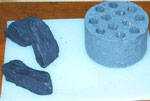
Chinese Scientists: Briquettes Better than Coal Chunks
 |
In an effort to reduce China's high air pollution levels, a new study recommends increased use of coal briquettes (right) in Chinese households instead of traditional coal chunks for heating and cooking. Credit: Yingjun Chen, Chinese Academy of Sciences |
Scientists in China are recommending that the government consider phasing out the direct burning of traditional chunks of coal in millions of households.
Instead, the government should substitute coal briquettes and improved stoves for cooking and heating to help reduce the country's high air pollution levels. The recommendation stems from one of the first scientific studies showing that this approach is effective in improving air quality, including a 98 percent reduction in air pollution from tiny, inhalable particles of coal soot. Their study is scheduled for the July 15 issue of the American Chemical Society's Environmental Science & Technology, a semi-monthly journal.
In the new study, Yingjun Chen and colleagues note that government officials have said for years that coal briquettes and improved stoves with better ventilation may cut emissions, but few scientific studies have tested this claim. Millions of homes in rural China and other parts of the world burn raw coal chunks in small, low-efficiency stoves for cooking and heating. Studies indicate that emissions from incomplete coal combustion in these stoves contribute significantly to China's serious air pollution levels — among the highest in the world.
The scientists compared emissions between traditional and improved stoves using either raw (unprocessed) coal chunks or coal briquettes. The briquettes consist of coal powder and clay and are molded into multihole columns. They found that burning briquettes in well-ventilated stoves dramatically reduced black carbon emissions by 98 percent and other emissions by more than 60 percent. The study concludes that this approach can bring about "explicit benefits in environment and health, together with possible gains in climate stabilization."